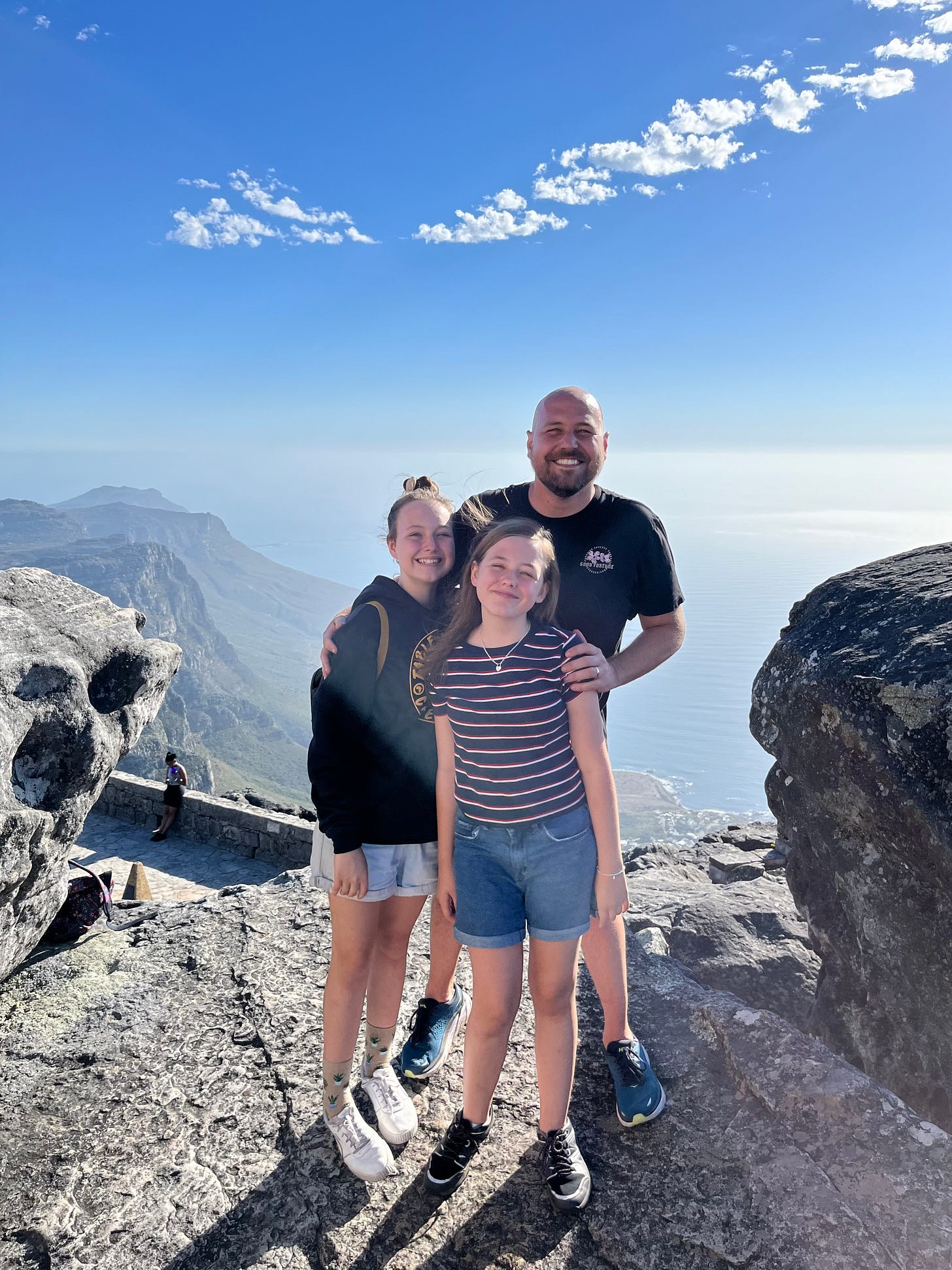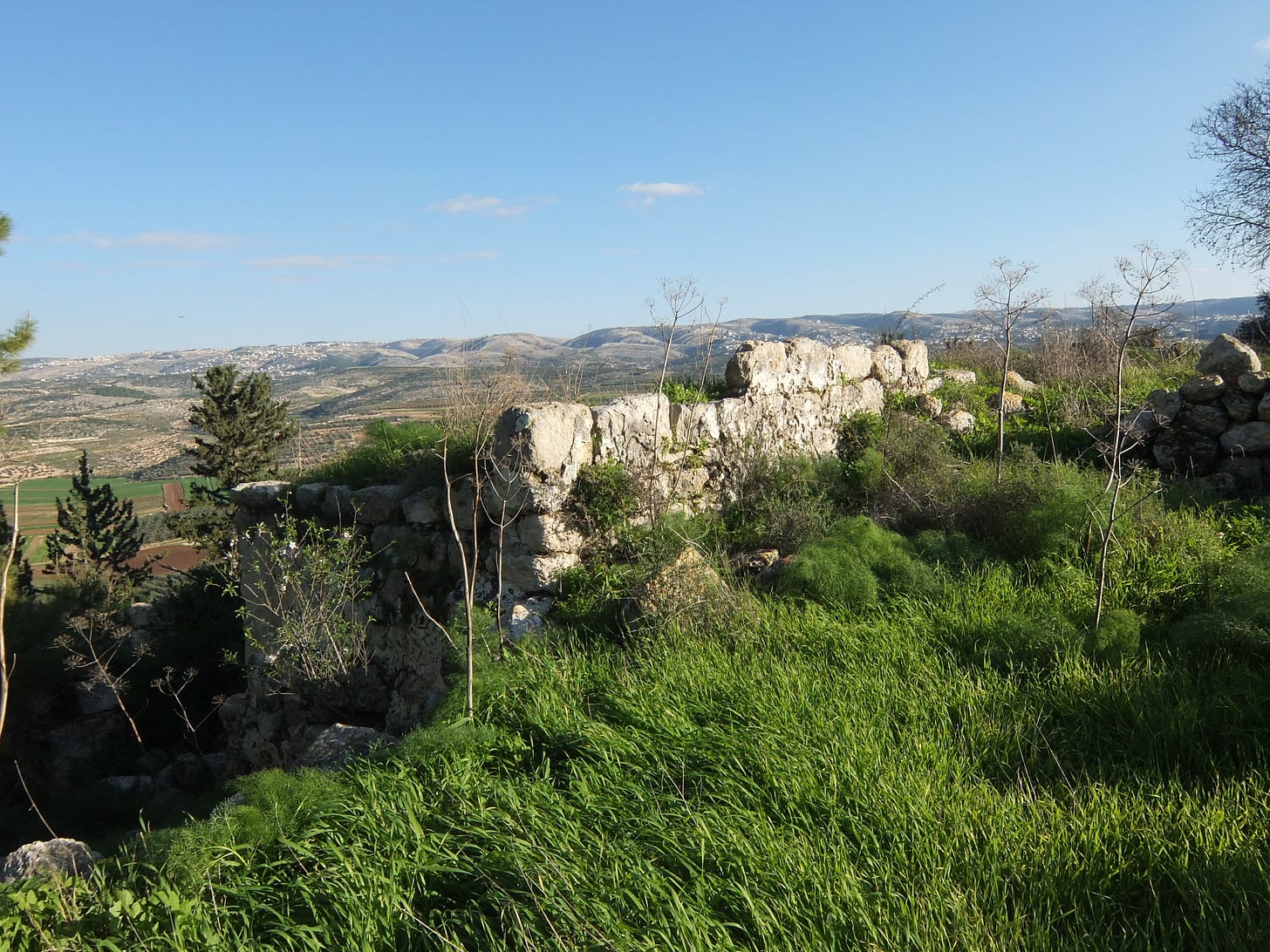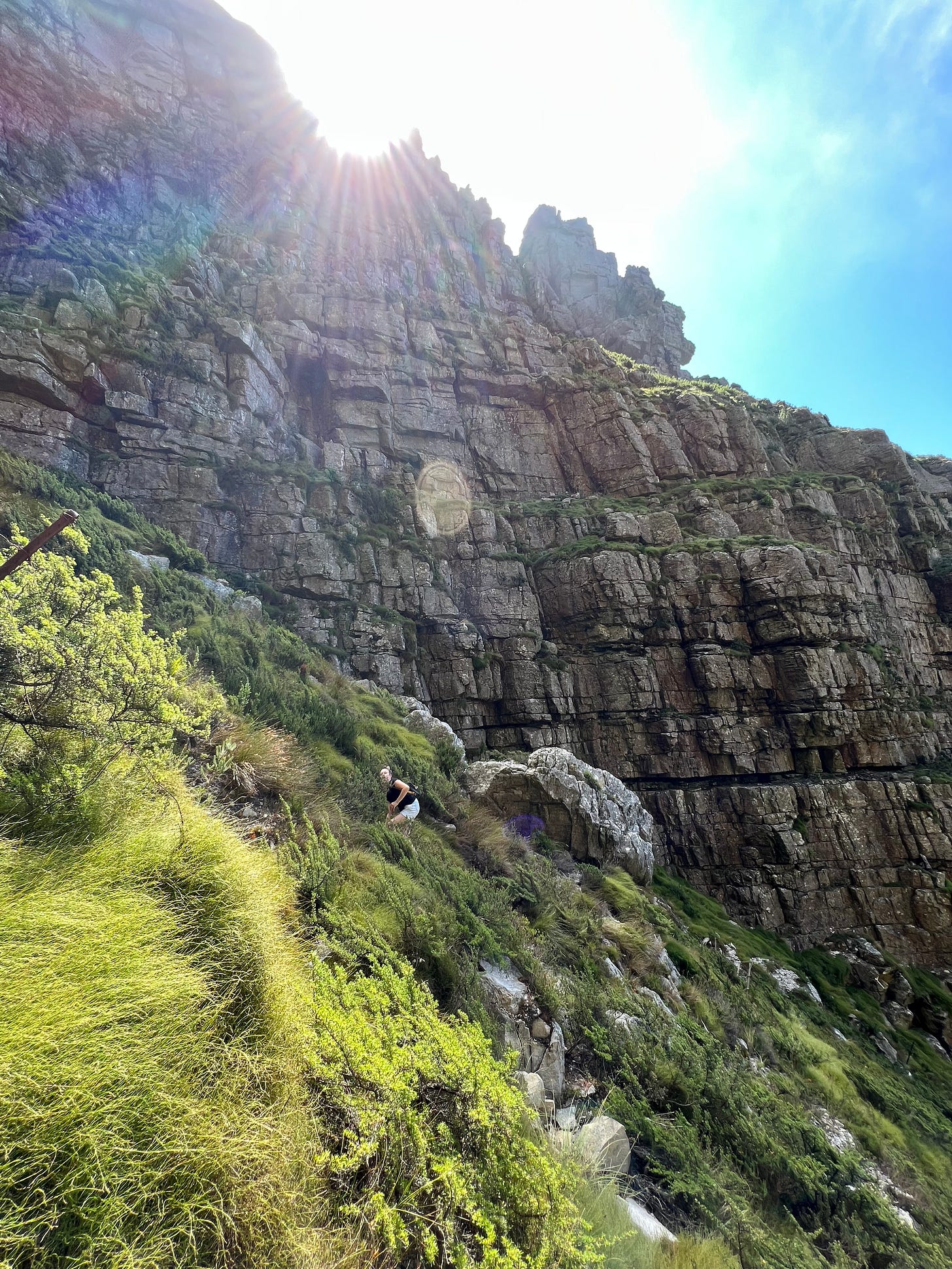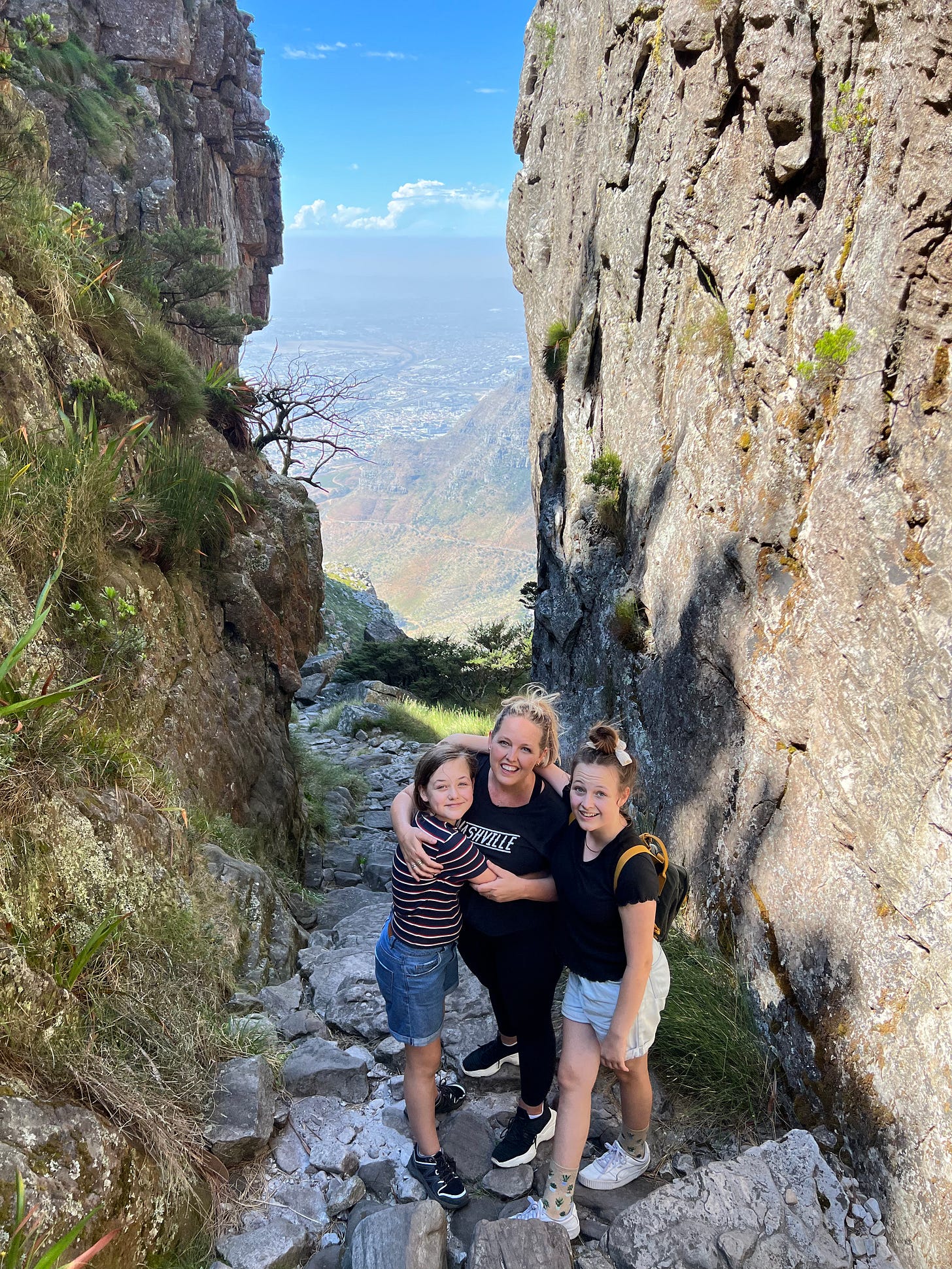When the Old Testament Is Too Much
Also, mind-blowing caves and why Table Mountain is calling your name
Hello! Hope you’re well this week, even in the midst of difficult news from the east. Here’s the latest:
Trigger Warning
Well, it was a Holy Ghost Stories first this week: I felt compelled to offer a content warning before this episode. As you well know if you’ve spent any time in the Old Testament, it’s a colorful text. Rife with violence, death, sex (both deviant and sanctioned), alcohol abuse, power plays…the Hebrew Scriptures provide an unvarnished picture of fallen humanity’s depths. (Honestly, it baffles me that we tell these stories to children more often and more intentionally than we tell these stories to adults.) And so it’s no small thing when, in a show that sources its content exclusively from the Old Testament, a particular episode warrants a warning. Alas, the story of Tamar is just such a story.
It’s the sexual abuse, really, that tipped this one over the edge. Skim the story in Genesis, and it comes off simply as a weird aside wedged in the middle of the Joseph narrative. But spend time in it, reflect on it, imagine it, and it becomes a graphic, disturbing, heartbreaking tale. (Spend longer inside it, I discovered—wander backward and forward in history, pull on some of the threads of Yahweh’s narrative tapestry and see where they lead—and the story becomes touching. Redemptive. But more on that in a bit.) Onan’s treatment of Tamar, in particular, promises to be especially distubing for anyone who carries open wounds from sexual trauma. And, of course, any story in which someone ejaculates on the ground is probably not suited for younger children. Hence, the warning at the beginning of the episode.
Land of A Thousand Caves
After Joseph is sold into slavery, Judah leaves his father and brothers and settles in Adullam, where a friend of his lives. (Genesis 38 mentions that Judah’s son Shelah was born in Chezib/Kezib, and though historians/archaeologists disagree as to the exact location of Chezib, it seems to have been in the same area as Adullam and may essentially be the same place.)
Adullam is famous for being the place where (generations after Judah) David hid from Saul in the cave and began amassing his crew of misfits and asylum seekers. It’s on the edge of the Valley of Elah, where David killed Goliath. (Perhaps his time in this storied place, reflecting on its history, is part of what influenced him to name his only daughter Tamar.)
Here’s a picture of present day ruins in Adullam:
Today, part of this area is designated by Israel as Bet Gurvin National Park. They call it “The Land of 1,000 Caves” and you absolutely have to visit this page on the Israeli Nature and Parks Authority website to see the 20-second looping video that takes you inside one of the caves. This will forever change whatever’s in your head when you read about David hiding out from King Saul.
Bits and Bobs
Here are some observations/questions/etc as I put this episode out into the world:
This story happens early in the Biblical timeline. Really early. It’s pre-Nehemiah. Pre-David. Pre-Ruth. Pre-Deborah or Samson. Pre-Moses. Pre-Joshua or Rahab. Everything that happens is happening with people in a sort of proto-relationship with Yahweh. Tamar and Judah live in Canaan before it’s taken (back) as such by Joshua and the post-Red Sea Israelites. It’s easy to overestimate the extent of anyone’s knowledge of God during these days. Did Tamar know Him? If she did, what did she know of Him? Before we judge these people and their relationship with God (or lack thereof), we should consider how little (compared to us) they had to work with.
In terms of a more immediate chronological context, scholars generally agree that the events related in Genesis 38 (and this episode) would have happened between Judah’s first and second visits to Egypt.
Why did Judah leave after Joseph was sold? Was it guilt and shame? A self-imposed exile? Having carried this around for years, dealing with his horrible sons and then grieving their untimely deaths as well as the death of this wife…Judah must have been a troubled man. I thought about this as he ordered Tamar burned alive for her alleged behavior. A guilty conscience often manifests itself in mercilessness.
I’m very interested in the overlap between the stories of Tamar and Rahab—both women feature in the lineage of Christ, their stories share a theme of reluctant prostitution, and in both narratives there’s a conspicuous scarlet cord. As a nod to their kinship, I scored the final scene of Tamar’s episode with the same piece I used for the final scene of Rahab’s story in Season 1. If you noticed, reply and let me know—I’ll buy you a drink at Starbucks. :)
Speaking of Rahab…Perez (the firstborn son of Tamar & her reluctant kinsman redeemer, Judah) will become the great, great, great grandfather of an Israelite man named Salmon who will marry a former Canaanite prostitute named Rahab. When he’s grown, Salmon and Rahab’s son Boaz will step forward as a kinsman redeemer himself. I like to think that Boaz knew the story of Tamar & Judah and wanted to do a little better than Judah before him.
The blessing at Boaz & Ruth’s wedding, by the way, centers on a shoutout to Tamar: “May your house be like the house of Perez, whom Tamar bore to Judah” (Ruth 4:12). As Tikva Frymer-Kensky points out, “Tamar’s (and Ruth’s) traits of assertiveness in action, willingness to be unconventional, and deep loyalty to family are the very qualities that distinguish their descendant, King David.”
When It All Lines Up
As you might imagine, scoring each episode of HGS is quite a challenge. Finding just the right piece for each scene (and then editing it to fit) takes a great deal of time and energy, and some episodes are harder to wrestle than others. But! That means some episodes are easier than others, right? :)
Anyway, I thought it’d be fun to share the way this episode worked out: the names of the musical pieces (which have already been created—I source them from subscription music libraries) lined up quite nicely with the themes of each scene. More than serendipitous, you might argue. :) Here are the noteworthy matches from this episode:
Scene 1: Tamar’s married life begins with hope— “Dawnstar”
Scene 3: Er, Tamar’s evil husband, is dead— “Sunlit Grave”
Scene 4: Onan essentially rapes Tamar— “Crooked Man”
Scene 6: Flashbacks to Joseph’s apparent death— “Requiem”
Scene 7: Judah’s wife dies— “Don’t Go”
Scene 8: Tamar siezes the day and escapes the cycle of disappointment and abuse— “Breaking Gravity”
Scene 12: Tamar is pregnant with twin sons— “Regain Once Lost”
Have You Listened?
If you haven’t heard it yet, give this episode a listen. I was changed by the time I spent in this story, and I hope it affects you as well. Here, without further ado, is “The Kinsman, the Widow, and the Mark.”
LISTEN ON: APPLE PODCASTS | SPOTIFY | AUDIBLE | ETC
If you’ve already listened, I’d love to hear your impressions. Were you familiar with this story? Did it spark feelings or thoughts? Reply and let me know.
Oh—and if you’d be so kind as to take 30 seconds and leave a review over on Apple Podcasts, it would mean so much. Thanks!
Come to the Table
Yesterday my family and I hiked/climbed up Table Mountain here in Cape Town. It’s an extraordinary hike and worth a spot on your list (if you keep lists like that).

Full disclosure: we took the cable car down.
No regrets.
4 Cool Things
Sinuous Branch Artist - I’m a big fan of what Charlie Baker is doing.
Classical Harmonica - If I could have 2 Incredible Talent Wishes, they’d be dancing and harmonica. No question.
Moondust - We’re watching our way (back) through The Crown with our daughters. Watching this episode again the other night reminded me of what an absolute masterpiece it is.
“Kissing In Vietnamese” - a poem by Ocean Vuong
My grandmother kisses
as if bombs are bursting in the backyard,
where mint and jasmine lace their perfumes
through the kitchen window,
as if somewhere, a body is falling apart
and flames are making their way back
through the intricacies of a young boy’s thigh,
as if to walk out the door, your torso
would dance from exit wounds.
When my grandmother kisses, there would be
no flashy smooching, no western music
of pursed lips, she kisses as if to breathe
you inside her, nose pressed to cheek
so that your scent is relearned
and your sweat pearls into drops of gold
inside her lungs, as if while she holds you
death also, is clutching your wrist.
My grandmother kisses as if history
never ended, as if somewhere
a body is still
falling apart.
That’s the latest! Be sure to check out “The Kinsman, the Widow, and the Mark” and share it with somebody who’d like it. Oh—and let me know if you caught that musical homage in the last scene. If so, I owe you a drink.
Gratefully,
Justin
*Know someone who needs this newsletter in their life? Pass it on to them.
**Want to team up with me to tell the stories of the Old Testament in new ways?










I like everything in this email. The caves, the harmonica, Ruth’s baby blessing, that poem!